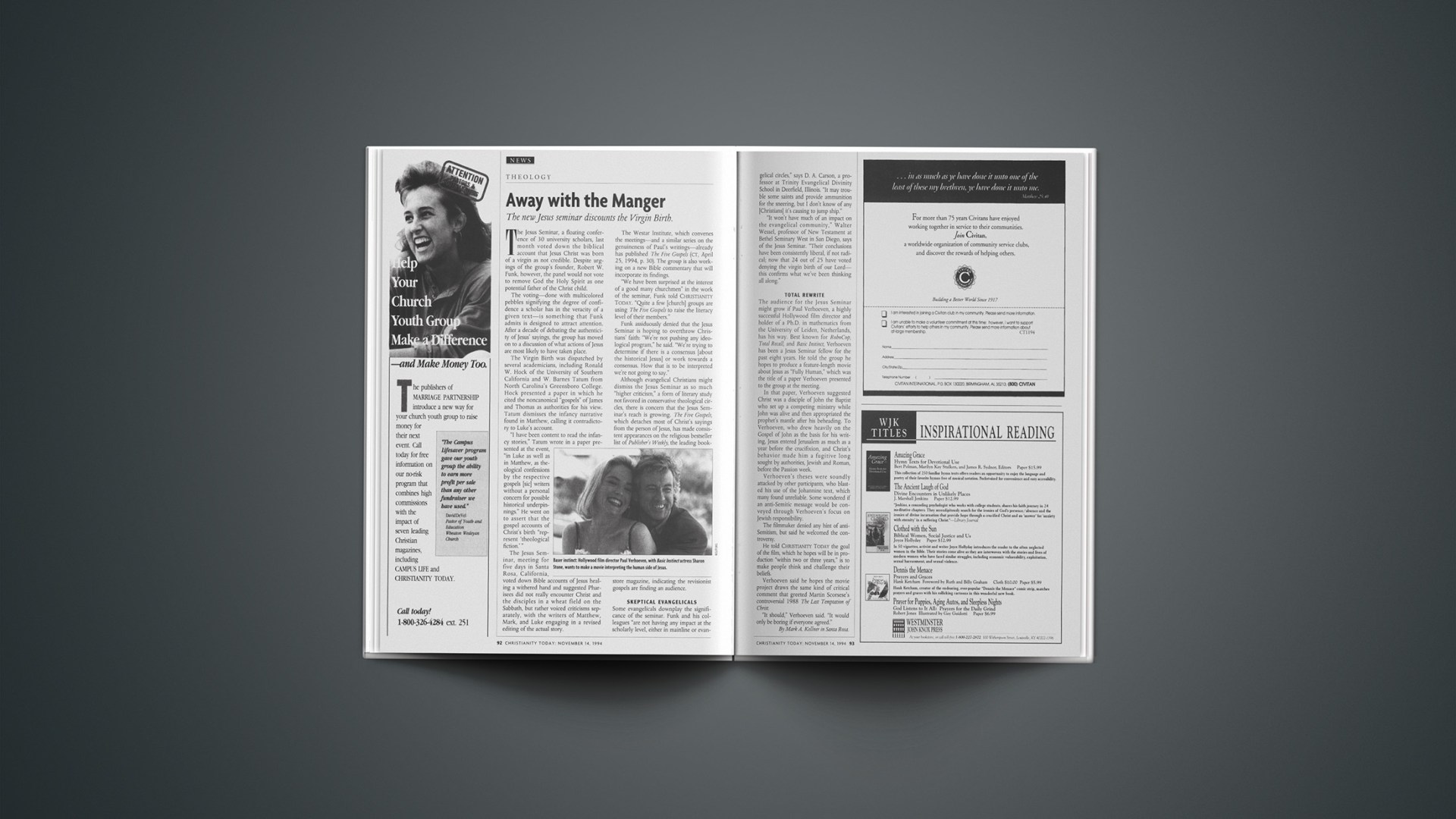The new Jesus seminar discounts the Virgin birth.
The Jesus Seminar, a floating conference of 30 university scholars, last month voted down the biblical account that Jesus Christ was born of a virgin as not credible. Despite urgings of the group's founder, Robert W. Funk, however, the panel would not vote to remove God the Holy Spirit as one potential father of the Christ child.
The voting-done with multicolored pebbles signifying the degree of confidence a scholar has in the veracity of a given text-is something that Funk admits is designed to attract attention. After a decade of debating the authenticity of Jesus' sayings, the group has moved on to a discussion of what actions of Jesus are most likely to have taken place.
The Virgin Birth was dispatched by several academicians, including Ronald W. Hock of the University of Southern California and W. Barnes Tatum from North Carolina's Greensboro College. Hock presented a paper in which he cited the noncanonical "gospels" of James and Thomas as authorities for his view. Tatum dismisses the infancy narrative found in Matthew, calling it contradictory to Luke's account.
"I have been content to read the infancy stories," Tatum wrote in a paper presented at the event, "in Luke as well as in Matthew, as theological confessions by the respective gospels [sic] writers without a personal concern for possible historical underpinnings." He went on to assert that the gospel accounts of Christ's birth "represent 'theological fiction.' "
The Jesus Seminar, meeting for five days in Santa Rosa, California, voted down Bible accounts of Jesus healing a withered hand and suggested Pharisees did not really encounter Christ and the disciples in a wheat field on the Sabbath, but rather voiced criticisms separately, with the writers of Matthew, Mark, and Luke engaging in a revised editing of the actual story.
The Westar Institute, which convenes the meetings-and a similar series on the genuineness of Paul's writings-already has published The Five Gospels (CT, April 25, 1994, p. 30). The group is also working on a new Bible commentary that will incorporate its findings.
"We have been surprised at the interest of a good many churchmen" in the work of the seminar, Funk told CHRISTIANITY TODAY. "Quite a few [church] groups are using The Five Gospels to raise the literacy level of their members."
Funk assiduously denied that the Jesus Seminar is hoping to overthrow Christians' faith: "We're not pushing any ideological program," he said. "We're trying to determine if there is a consensus [about the historical Jesus] or work towards a consensus. How that is to be interpreted we're not going to say."
Although evangelical Christians might dismiss the Jesus Seminar as so much "higher criticism," a form of literary study not favored in conservative theological circles, there is concern that the Jesus Seminar's reach is growing. The Five Gospels, which detaches most of Christ's sayings from the person of Jesus, has made consistent appearances on the religious bestseller list of "Publisher's Weekly," the leading bookstore magazine, indicating the revisionist gospels are finding an audience.
SKEPTICAL EVANGELICALS
Some evangelicals downplay the significance of the seminar. Funk and his colleagues "are not having any impact at the scholarly level, either in mainline or evangelical circles," says D. A. Carson, a professor at Trinity Evangelical Divinity School in Deerfield, Illinois. "It may trouble some saints and provide ammunition for the sneering, but I don't know of any [Christians] it's causing to jump ship."
"It won't have much of an impact on the evangelical community," Walter Wessel, professor of New Testament at Bethel Seminary West in San Diego, says of the Jesus Seminar. "Their conclusions have been consistently liberal, if not radical; now that 24 out of 25 have voted denying the virgin birth of our Lord-this confirms what we've been thinking all along."
TOTAL REWRITE
The audience for the Jesus Seminar might grow if Paul Verhoeven, a highly successful Hollywood film director and holder of a Ph.D. in mathematics from the University of Leiden, Netherlands, has his way. Best known for RoboCop, Total Recall, and Basic Instinct, Verhoeven has been a Jesus Seminar fellow for the past eight years. He told the group he hopes to produce a feature-length movie about Jesus as "Fully Human," which was the title of a paper Verhoeven presented to the group at the meeting.
In that paper, Verhoeven suggested Christ was a disciple of John the Baptist who set up a competing ministry while John was alive and then appropriated the prophet's mantle after his beheading. To Verhoeven, who drew heavily on the Gospel of John as the basis for his writing, Jesus entered Jerusalem as much as a year before the crucifixion, and Christ's behavior made him a fugitive long sought by authorities, Jewish and Roman, before the Passion week.
Verhoeven's theses were soundly attacked by other participants, who blasted his use of the Johannine text, which many found unreliable. Some wondered if an anti-Semitic message would be conveyed through Verhoeven's focus on Jewish responsibility.
The filmmaker denied any hint of anti-Semitism, but said he welcomed the controversy.
He told CHRISTIANITY TODAY the goal of the film, which he hopes will be in production "within two or three years," is to make people think and challenge their beliefs.
Verhoeven said he hopes the movie project draws the same kind of critical comment that greeted Martin Scorsese's controversial 1988 The Last Temptation of Christ.
"It should," Verhoeven said. "It would only be boring if everyone agreed."
Copyright © 1994 Christianity Today. Click for reprint information.










